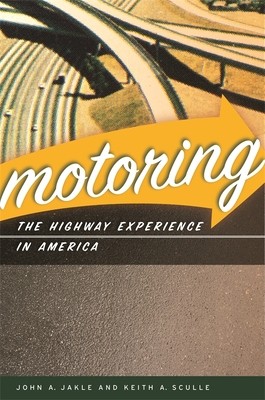
- We will send in 10–14 business days.
- Author: John A Jakle
- Publisher: University of Georgia Press
- ISBN-10: 0820334154
- ISBN-13: 9780820334158
- Format: 14.7 x 22.4 x 2 cm, minkšti viršeliai
- Language: English
- SAVE -10% with code: EXTRA
Reviews
Description
Motoring unmasks the forces that shape the American driving experience--commercial, aesthetic, cultural, mechanical--as it takes a timely look back at our historically unconditional love of motor travel. Focusing on recreational travel between 1900 and 1960, John A. Jakle and Keith A. Sculle cover dozens of topics related to drivers, cars, and highways and explain how they all converge to uphold that illusory notion of release and rejuvenation we call the "open road."
Jakle and Sculle have collaborated on five previous books on the history, culture, and landscape of the American road. Here, with an emphasis on the driver's perspective, they discuss garages and gas stations, roadside tourist attractions, freeways and toll roads, truck stops, bus travel, the rise of the convenience store, and much more. All the while, the authors make us think about aspects of driving that are often taken for granted: how, for instance, the many lodging and food options along our highways reinforce the connection between driving and "freedom" and how, by enabling greater speeds, highway engineers helped to stoke motorists' "blessed fantasy of flight." Although driving originally celebrated freedom and touted a common experience, it has increasingly become a highly regulated, isolated activity. The motive behind America's first embrace of the automobile--individual prerogative--still substantially obscures this reality. "Americans did not have the automobile imposed on them," say the authors. Jakle and Sculle ask why some of the early prophetic warnings about our car culture went unheeded and why the arguments of its promoters resonated so persuasively. Today, the automobile is implicated in any number of environmental, even social, problems. As the wisdom of our dependence on automobile travel has come into serious question, reassessment of how we first became that way is more important than ever.EXTRA 10 % discount with code: EXTRA
The promotion ends in 21d.18:14:03
The discount code is valid when purchasing from 10 €. Discounts do not stack.
- Author: John A Jakle
- Publisher: University of Georgia Press
- ISBN-10: 0820334154
- ISBN-13: 9780820334158
- Format: 14.7 x 22.4 x 2 cm, minkšti viršeliai
- Language: English English
Motoring unmasks the forces that shape the American driving experience--commercial, aesthetic, cultural, mechanical--as it takes a timely look back at our historically unconditional love of motor travel. Focusing on recreational travel between 1900 and 1960, John A. Jakle and Keith A. Sculle cover dozens of topics related to drivers, cars, and highways and explain how they all converge to uphold that illusory notion of release and rejuvenation we call the "open road."
Jakle and Sculle have collaborated on five previous books on the history, culture, and landscape of the American road. Here, with an emphasis on the driver's perspective, they discuss garages and gas stations, roadside tourist attractions, freeways and toll roads, truck stops, bus travel, the rise of the convenience store, and much more. All the while, the authors make us think about aspects of driving that are often taken for granted: how, for instance, the many lodging and food options along our highways reinforce the connection between driving and "freedom" and how, by enabling greater speeds, highway engineers helped to stoke motorists' "blessed fantasy of flight." Although driving originally celebrated freedom and touted a common experience, it has increasingly become a highly regulated, isolated activity. The motive behind America's first embrace of the automobile--individual prerogative--still substantially obscures this reality. "Americans did not have the automobile imposed on them," say the authors. Jakle and Sculle ask why some of the early prophetic warnings about our car culture went unheeded and why the arguments of its promoters resonated so persuasively. Today, the automobile is implicated in any number of environmental, even social, problems. As the wisdom of our dependence on automobile travel has come into serious question, reassessment of how we first became that way is more important than ever.

Reviews